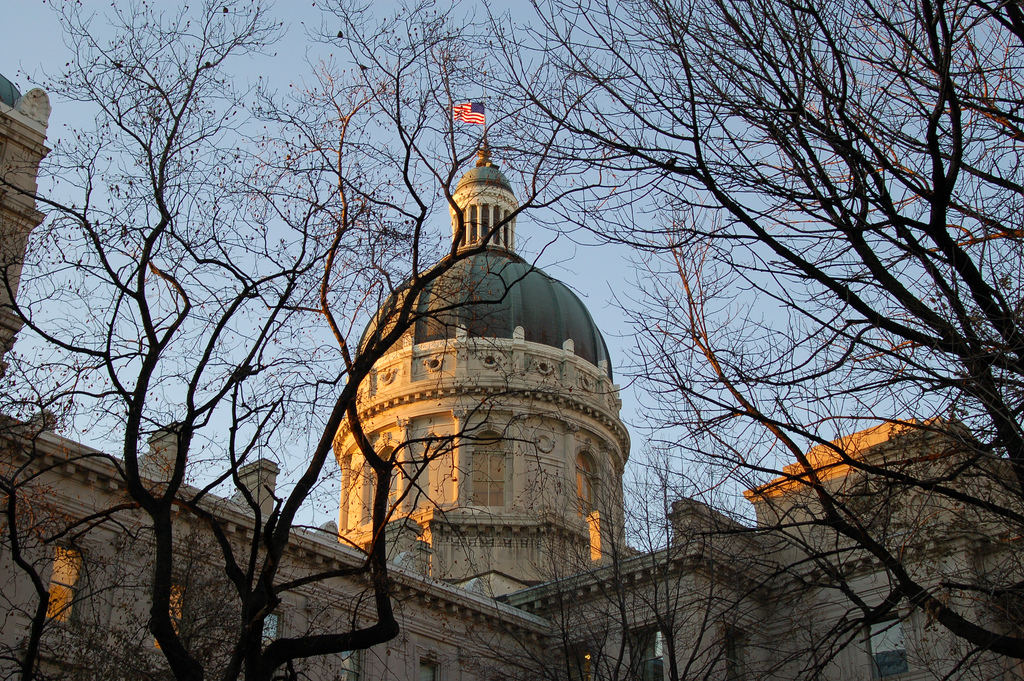This article has a set of discussion questions tailored for classroom use. Click here to download them. To see a full list of articles with discussion questions and other resources, visit our “Educational Resources” page.
The small Indiana town of East Chicago sits roughly 25 miles southeast of downtown Chicago. In late July, East Chicago’s mayor and the Environmental Protection Agency began informing residents that their soil had been contaminated with lead since at least 2014. But it was only a few weeks ago that the city began the process of evacuating nearly 1200 residents out of their housing complexes. The reason for this evacuation coincides with the rich industrial history of East Chicago: the smelting of lead.
Like many cities near the northernmost Indiana-Illinois border, East Chicago was at the heart of the Industrial Revolution. Known for not only its steel production but also its large population of immigrants, East Chicago was once hailed as “The Arsenal of America,” and proof that America was truly a melting pot. East Chicago’s present, however, looks very different than its past.The median household income of East Chicago is over $20,000 less than the Indiana average. On top of economic hardship, East Chicago residents are facing an environmental health crisis.
Lead is one of the most heavily regulated pollutants in the United States, with 7 major environmental policies monitoring its presence in air, water, soil and buildings. Despite the definite confidence that lead is toxic to humans and other animals, many industrial processes once used it heavily. In fact, between 1920 and 1985, East Chicago was home to two different lead refineries, U.S.S. Lead and Anaconda Lead. Though Anaconda Lead shut down in 1936, and U.S.S. Lead in 1985, an inspection by the EPA found the area around each factory to be toxic enough to potentially qualify as a Superfund Site. At this point, U.S.S. Lead’s parent company, Sharon Steel Corp, declared bankruptcy and the EPA did not receive the permission to deem the 72 acre area as a Superfund Site. The EPA finally declared the area a Superfund Site 17 years later, in 2009.
Since the discovery of lead contamination, the EPA has sued U.S.S. Lead twice, once in 1991 and again in 2012, though the ownership of U.S.S. Lead fell under the title of the Atlantic Richfield Company and E.I. Du Pont de Nemours and Co. During both of these lawsuits, and the time in between, residents of a 346-unit housing complex built in the 1970’s were actually living on the contaminated soil, with no knowledge of their proximity to toxic levels of lead. To put that in perspective, two entire generations of people were exposed to high levels of lead – in some areas, 228 times the EPA’s maximum level of safe exposure.
The situation in East Chicago is a crisis that demands justice, but who is at fault? The EPA states its mission “is to protect human health and the environment.” The EPA has been aware of dangerous levels of lead in East Chicago’s soil for over two decades, but has failed to begin cleaning up the site at all. Some may point out that this stems from the complicated process of declaring an area as a Superfund priority. However, it appears as though the EPA simply gave up or forgot about the area for nearly 20 years, despite the immediate threat it posed to human health. In addition, between 1992 and 2009, the EPA declared four additional areas as Superfund Sites in Indiana, 3 of which were less toxic than the U.S.S. Site. Every one of these sites – Terre Haute, Elkhart, Evansville, and Westfield – has a higher median household income and percentage of white citizens than East Chicago. Is it fair to say that the EPA not only ignored this public health crisis, but did so because of institutional racism and classism?
On the other hand, some might blame the very companies that are responsible for contaminating the area as most responsible. After all, if it wasn’t for U.S.S. Lead and Anaconda Lead, wouldn’t the area be safe for habitation? Even though lead was not heavily regulated until 1992, lead has been known to be a toxic substance since the 19th century. Mishandling a known toxic substance might be reason enough to blame only the lead refineries. Additionally, it took U.S.S. Lead’s subsidiaries two years to respond and settle the 2012 lawsuit with the EPA. Some might point out that neither company that polluted the area still exists, and it is nearly impossible to pin blame when U.S.S. Lead has changed ownership so many times. However, isn’t the same argument valid with the EPA as well? Since 1992, the EPA has had 14 different head administrators.
Thankfully, the EPA’s 2012 lawsuit against Atlantic Richfield Company and E.I. Du Pont de Nemours and Co. resulted in a $26 million settlement to begin cleaning up the area. Unfortunately, irreversible damage has already been done to citizens of East Chicago. Who is more morally corrupt: the perpetrator or the action-less bystander? How can we hold entities responsible for causing or allowing environmental damage and human health crises to occur? Is it possible or right to seek justice when the perpetrators of such acts are not still in power or even alive?
Perhaps the problem lies in attempting to hold people accountable for their actions, and lack thereof, of multiple entities over decades. The longevity of a crime should not determine its likelihood of meeting justice, but that seems to be the problem.The perpetrator is absent from the crime and there are too many action-less bystanders to blame. Ironically, the people of East Chicago have been blindly suffering for too long to find peace in holding anyone accountable.








